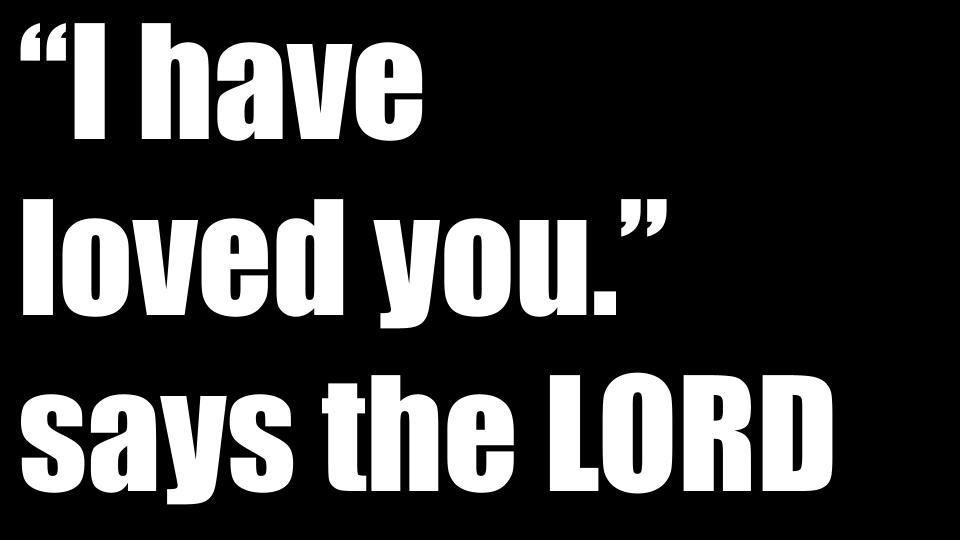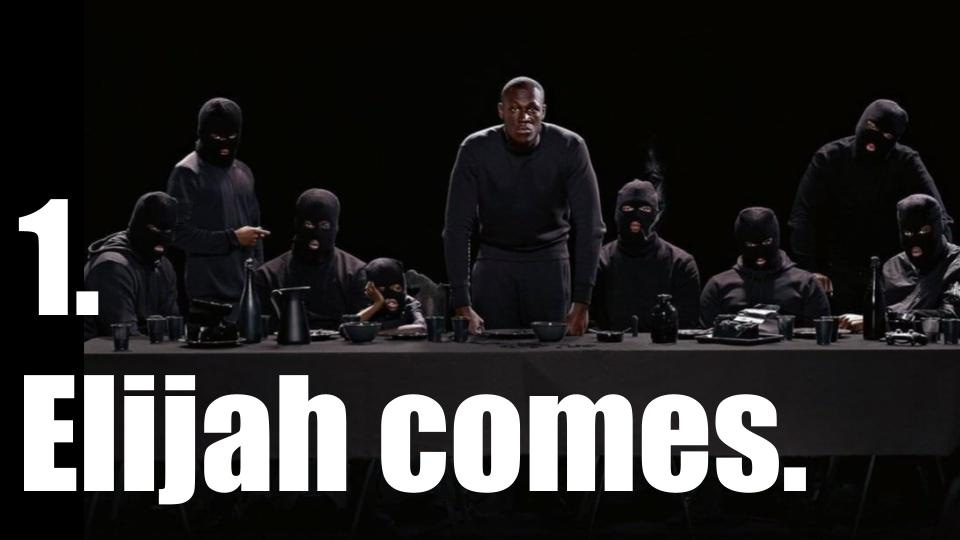I have loved you
To begin as Malachi does:
“I have loved you,” says the LORD.
How do you read that?
How does it land?
“I have loved you,”
“I have loved you,”
“I have loved you,”
I can imagine it as Karen O’s devasted refrain in the song Maps: #they don’t love you like I love you.. Re Josephine’s sermon on Zephania - the role of songs
I have loved you.
Have you ever tried to communicate that to someone? Communicating that with nuance and power. This is the problem I’m solving for.
How could we be a more prophetic community? What would it look like? What would it achieve? What would it require? What is successfully prophetic communication? Specifically for St Marks, What would it look like for us. How can we, as St Marks, be better prophets? To one another. To the world.
Interesting for me to set this in the context of the suggestion that the development at Monty Hall should be prophetic. What do we mean?
Minor Prophets series
Why are you still coming? Have you listened to these last sermons? Have you changed? Prophecy should change you.
This is the last series in the minor prophets, which has corresponded to a long season of me thinking about prophecy.
What is prophecy?
Do you think about prophecy?
What are you meant to do with it? ~ do what the Prophets say?
And how are you meant to do it? ~ do what the Prophets do?
Danger. Do not despise prophecy. Do not idealise past prophecy. You honour the tombs of the prophets.. woe to you. How to look back without nostalgia and apply the right lessons?
We need, not only, and not so much, to look at prophecy that was and to interpolate it’s message to today. We need to consider the gift and the role of the prophet, the eyes to see and the ears to hear, that enabled, empowered that form of communication
Lk11v49-50 Fifty years ago yesterday, Martin Luther King was assassinated. A prophet, an apostle, persecuted and killed. Who killed him? 🙋♂ I did.
- Prophets are perennially inconvenient.
- We are perpetually evil.
Jordan Peterson, notedly not a historian, nevertheless makes the valid observation from Browning's Ordinary Men and Solzhenitsyn's Gulag Archipelago about who perpetrated evil in history. The honest answer is that I did. Evil is not so much out-there, as it is in-here. My depraved capacity in another context is capable of untold evil. Within me is a selfish monster, vindictive, corrupt, shameless, and Mt5v21-22 - it's all murder.
Prophetic practice as-was and as-is
Contemporary practice
To be prophetic is not just to apply their prophecy to ourselves, it is to consider that the universe is one in which prophecy is possible, normal and necessary
To look at the prophets and believe in prophecy generally and to apply not just their content but their form, not just their message but their medium
Not just a curiosity of predicting Christ then, foreshadowing redemption in first century. It is a pattern for life now as way straightening and Christ anticipating
Different prophets for different seasons and different audiences
Needs an emotional vulnerability. How would you create an effective forum to hear Malachi today? Secure attachment, patient listening
What is prophecy?
Prophetic category/style - a type of communication?
Prophecy as asking honest questions
Prophecy as a tone/attitude
Prophecy as witty rhetoric
Prophecy as interpreting the zeitgeist
Prophecy as predicting the future
Prophecy as intention/reception by prophet from God?
Prophecy as the action of a prophet
Prophecy as insight received
Prophecy as preaching delivered
Prophecy as a burden carried
Prophecy and a imperative obeyed
Prophecy as effect when declared by prophet to public?
Prophecy as the action of a prophet’s audience
Prophecy as effecting internal reform
Prophecy as public facing counterculture
Prophecy - re John the Baptist, a paradigm of preparation.
Prophetic as form as not synonymous with good nor with true nor with provocative.
If there can be false prophets, then you have to be prophetic AND good/true. Also it is possible good and communicate things that are not untrue etc, but you nevertheless are not necessarily being prophetic. The danger of christianese lumping together all the virtues to a lowest common denominator. There is something crucial, and critical about prophecy qua prophecy. And pitch that the prophetic-ness of prophecy is beyond true and false and must question effective and ineffective.
What is not prophecy?
In one possible high rendering of prophetic communication, one could have “unprophetic” communication that may not be untrue but it is either abstract/static or anecdotal/incidental.
Prophecy as form as effective communication
- Prophecy must bridge the chasm between the prophet and the audience. It cannot be dismissed, it must disrupt. It cannot merely be true, or interesting, or theologically “sound”. It should not merely be socially concerned, relevant..
How to preach?
Solving a problem together
Vs i tell you to do x
Vs inform you about something
Malachian pattern
I’m thinking about this sermon on Malachi, which will be a sermon on prophecy, hopefully a sermon about the felicity conditions for effective prophetic communication, hopefully a prophetic sermon on prophecy calculated to facilitate the felicity conditions for the communication of its communication.
Felicity conditions for effective minor prophecy:
Forum and expectation
Character and language
Rhythm of confession
What contract between preacher and audience? What permission?
Lk20v11-12 The servants are prophets. The prophets are rent collectors in Jesus' rendering. As someone who would identify as more prophet than priest or king, how do I feel about the rent-collector mantle? You need to hear grace, but grace abstracted from justice is too easily embezzled. But how to preach justice, how to call people to repentance?
I may well feel that you should tithe more, but none of you has given me that license to invoke an ought, to lay a critique, to command obedience. What would it be for me to be such a mouth piece for such a covenant community?
How to preach about-prophecy? How to preach as-prophecy?
Prophecy as form as effective communication over against disbelief. Prophecy presupposes that it needs to be said. Prophecy assumes a non-neutral audience, prophecy is not preaching to choir, not telling you things you already believe and apply. If prophecy needs to be said, then it is inherently something that doesn’t want to be heard - how do you organise to want what isn’t wanted, to soberly future fix the platforming of words we won’t want to hear?
Mk16v13-14 And they went back and told the rest, but they did not believe them. Afterward he appeared to the eleven themselves as they were reclining at table, and he rebuked them for their unbelief and hardness of heart, because they had not believed those who saw him after he had risen
Disbelief: What do you disbelieve? Who do you disbelieve? Christianity is a story told by story-tellers, fallible story-tellers to fallible story-tellees ~ it is a fraught form. Christianity is not an invitation to credulity, but Christianity is a conviction in an implausible claim. How do you but disbelieve?
Rm10v17 So faith comes from hearing, and hearing through the word of Christ.
Believing comes by hearing. But how? How to discern signal from noise? How to unwound calloused ears hardened of hearing unfulfilled saving claims?
1Th5v19-21 Do not quench the Spirit. Do not despise prophecies, but test everything; hold fast what is good
Ear-protection is easily done, prophecy is easily despised, diffused and held in contempt.
Prophecy as as form as personally transformative communication
- Prophecy must get under the skin of its listeners, to the place where transformation happens. Prophecy must transform, it must have teeth. It is not enough for me to stand here and blythely say, this may be of interest to you. Cerebrally. FYI your house is on fire. Reaction against Pharisees who tie heavy weights and don't lift a finger? Or tell what itching ears want to hear? False peace peace? Prophets meant to tell you things you don't want to hear. Preaching Vs not welcome in his own town. Scripture is meant to mature you. To break and remake you. To make you resilient and supple - so it's interpretation to our community via preaching ought to get beneath your skin. Preaching to call upwards. You need this prophetic harrowing. It is a high calling, s difficult task
Prophecy as form as collectively transformative communication
- Prophecy address a group. The leadership. The system. A problem with individualised ideas around faith, is that we do not constitute as an addressible body, responsible for our constitution. If there is a we who takes responsibility for the integrity, holiness, effectiveness of the we it is stewarding, then the prophet is punching up. If not. The sorts of forms of prophetic communication that excoriate social and systemic woes, land only on the individual, and are a punching down, a laying a supra-personal burden on the individual too heavy to carry.
Prophecy is a call to build the temple, presupposing God is enabling a plausibility structure and is motivated to be so invested. Prophecy as a one-to-the-many act of communication is both downstream and upstream of church churching as a more-than-the-sum-of-its-parts. The temple that we-are. You are being built together.
Also to consider we should hear this as an message to convict ourselves, but not to rest there, we are to be a prophetic presence, a demonstration, to convict a post-christian nation.. Prophets that were - action re Temple. Haggai. What is the temple in your life? Yes, but also what is the temple in our life.
Prophecy as form as contextual and specific
Prophecy as prophecy must be specific and contextual not merely generic repentance, not merely parallelisms. Prophecy is a calling back, and a calling up and calling forward - and all, in the context of the specific fall of a specific people. Prophecy that rehashes old testament calls, or revisits recent revivals, is indistinguishable from mere nostalgia for golden-age LARPing. Prophecy is a specific call to specific repentance. Who does that? And how? Different prophets for different times
Prophecy as form and Language
I have loved you.
How to make this carry
How to make this stay
How is this not
’Twas brillig, and the slithy toves
Did gyre and gimble in the wabe:
All mimsy were the borogoves,
And the mome raths outgrabe.
Prophecy as form as argument - the convicting force of Rhetorical Questions
Prophecy as content as argument
Meaning making and argument. Malachi argues for..
Let me show you how
1v2 Does God Love? All of a favouring four loves love? How can it be?
2v10 Is he 'Father'? Is there really a creator of all this?
3v17 Is He just? How? - Honest questions, several pints into an evening we reach these.
They hurt a little. They hurt a lot. Presuppositional foundations in the architecture of reactive unbelief. How is my sense of urgent responsibility to articulate these, even tacitly, to a hurting world?
Rhetorical questions. Somewhat as Jb38-41, God uses questions as a refining soap/fire v2. We know the answers, we are without excuse, and questions draw out our inconsistencies. Am I listening to Jesus' questioning? Jn21v15
Prophecy as form as teaching memorably - mnemonic force of chiastic structure
[A-B-C-C-B-A - Chaismic structure of God’s greatness and missional ambition - nested in that is the formation of a church practice - nested in that is the intimacy of marital fidelity Historic/Cosmic-Symbollic/Iconic-Practical-Practical-Symbollic-Global]
See Caroline’s sermon on Zechariah - the role of chiastic structure
Not just a Chiasm-shit-sandwich
Mnemonic - Interactive forms of learning beyond recall and the parabolic
Subjunctive As-if synecdoche recursive - Fractal everything
Form and content. The gateway is election and at the heart of God’s universe is fidelity. Concentric prophecy. A prophecy inside a prophecy inside a prophecy. I consider prophecy widely is rendered in literal spatiality of liturgical architecture, but also in the civic and domestic renderings of architecture built to embody a layered universe. Architecture as mnemonic speaking from memory into memory. Malachi bookends with promises past ~ I have loved you.. and I will send a message and you will skip like lambs.
MALACHI
Malachi in context
Most scholars agree that Malachi was probably a contemporary of Ezra and Nehemiah in the mid-fifth century B.C. This is supported by the implied temple reconstruction c. 516 B.C. and sins reproved by Malachi and those reproved by Ezra and Nehemiah.
corruption of the priesthood (Neh. 13:4–9, 29–31; Mal. 1:6–2:9),
marriage to idolaters (Ezra 9–10; Neh. 10:30; 13:1–3, 23–27; Mal. 2:10–12),
abuse of the disadvantaged (Neh. 5:1–13; Mal. 3:5),
failure to pay tithes (Neh. 10:32–39; 13:10–13; Mal. 3:8–10).
ESVSB describes Mal as standing against 'diluting the strenuous demands of proper worship', against 'cynicism' and issuing a call to 'renewed covenant fidelity'. Our response to election should entail a Pauline anguish at nominality Rm9v3 in our lives and our church. One of the organising patterns is an accumulating litany of attitudes and actions that are offensive to God. Another is an expanding portrait of the coming Messiah and the blessings that he will bring.
Common repeated pattern is as follows:
(1) God voices an indictment of his people for bad behavior;
(2) the people are pictured as asking God how his charge is true;
(3) God replies to the question, in the process of which he expands the charge. God’s indictments are sometimes phrased as rhetorical questions (e.g., 1:6 and 8; 2:10 and 15).
The Hebrew name “Malachi” means “my messenger,” or perhaps “messenger of (the LORD)” A messenger about messaging. The last word in the old testament.
[A 1. Elective love of God. There is responsibility.]
Predestination - Esau/Jacob
It is hard to hear the notion of a capricious prejudicial God. A popular creed of universal generalised love chaffs against the interpretable notion of a racist God who discriminates. We think it hard to espouse a idea that God chooses. But. I would argue, it is much harder to hear and to truly receive - the idea of being chosen. If chosen. You are not a victim, you are not hard done by, you have no license to proceed on the basis of resentment, you are not nothing, you are not an accident of timeXchanceXmatter, you are born into a grave responsibility. You are in charge now.
Selective, comparative love is the biggest love we can offer to illustrate the love of God. If the universe is not indifferent, i need to respond. If the universe is not indifferent, we need to consider how to do the doing of creating a sense of this.
How has God loved me? Dominion and the benefits of Christendom. How has God loved us. Materially but that is not automatic. But meaningfully. We live in a universe that is interrogable. Knowable meaningful justice
vs. Self-pity - collectively - Church in decline. Post evangelical say bekinder. Victim complex of post Evan woe is me & Self pity
vs. Self-pity - personally - Resentment. Last 4 employments dissolved because of toxic combo of Christian naivete and Christian corruption
Why did Christendom choose Europe? What did I do to deserve to live in a country with a health care free at the point if service? We live in the promised land and we are spaffing the privilege up the wall in a left leaning belly aching
Everyone believes in the kingdom of God just not the king
Everyone believes in grace just not the cost of the gift
"the things we hold to be self-evident moral truths turn out, on closer examination, to be specific inheritances from Christianity."
“For the normative self-understanding of modernity, Christianity has functioned as more than just a precursor or catalyst. Universalistic egalitarianism, from which sprang the ideals of freedom and a collective life in solidarity, the autonomous conduct of life and emancipation, the individual morality of conscience, human rights and democracy, is the direct legacy of the Judaic ethic of justice and the Christian ethic of love. This legacy, substantially unchanged, has been the object of a continual critical reappropriation and reinterpretation. Up to this very day there is no alternative to it. And in light of the current challenges of a post-national constellation, we must draw sustenance now, as in the past, from this substance. Everything else is idle postmodern talk.”
― Jürgen Habermas - Wizard of the Crow
In our own day Holland finds pervasive Christian influence everywhere he looks in the West. The self-evident truths of the American Declaration of Independence—that all men are created equal and endowed with the right to life, liberty, and the pursuit of happiness—are not remotely self-evident to a student of antiquity or other world religions. But that’s the genius of this Christian revolution, Holland argues. He writes, “The surest way to promote Christian teachings as universal was to portray them as deriving from anything other than Christianity.”
This is why the cross, that ancient implement of torture, remains what it has always been: the fitting symbol of the Christian revolution. It is the audacity of it—the audacity of finding in a twisted and defeated corpse the glory of the creator of the universe—that serves to explain, more surely than anything else, the sheer strangeness of Christianity, and of the civilization to which it gave birth. Today, the power of this strangeness remains as alive as it has ever been. It is manifest in the great surge of conversions that has swept Africa and Asia over the past century; in the conviction of millions upon millions that the breath of the Spirit, like a living fire, still blows upon the world; and, in Europe and North America, in the assumptions of many more millions who would never think to describe themselves as Christian. All are heirs to the same revolution: a revolution that has, at its molten heart, the image of a god dead on a cross.”
― Tom Holland, Dominion: How the Christian Revolution Remade the World
1 The oracle of the word of the LORD to Israel by Malachi.
The Lord's Love for Israel
2 “I have loved you,” says the LORD. But you say,
“How have you loved us?”
“Is not Esau Jacob's brother?” declares the LORD. “Yet I have loved Jacob 3 but Esau I have hated. I have laid waste his hill country and left his heritage to jackals of the desert.” 4 If Edom says, “We are shattered but we will rebuild the ruins,” the LORD of hosts says, “They may build, but I will tear down, and they will be called ‘the wicked country,’ and ‘the people with whom the LORD is angry forever.’” 5 Your own eyes shall see this, and you shall say, “Great is the LORD beyond the border of Israel!”
[B 2. The pursuit of excellence in leadership/worship. Fatherhood. Phoning it in. Priesthood]
If I am a Father where is my honour..
Turn the hearts of sons to fathers..
Fatherhood needs honour - a respecting the uniform. To be sure, father need to conduct themselves honourably and respectably, but. It is possible to so deconstruct the notion of fatherly authority, to so freeload on the coattails of past patriarchy and eat the seedcorn of nascent fatheriness that is stunts and never comes to full fruit. Parenting, in all forms is a responsible authority and as such deserving of honour. Fatherhood stands against a zeigeist of fullstack buffoonery Homer Simpson Family Guy nihilism where there is nothing honourable in the mantle. There is so great a need for playful affection and reverential fear in the export of successful fathering.
Man, I've got grown men @ing me bullshit
You're getting way too old for the timeline
You're getting way too old for a diss
Should've looked after your kids
Get out the booth, go home to your son
It's never too late to commit
It's like man love put my name in a bar
There needs to be advocates of such explicit fathering. There needs to be a higher view of fatherhood in culture generally than the Bumbling Dad Trope. I would argue, you cannot pray “Abba Father..” and throw lazy shade on the patriarchy-as-only-pejorative. Pick a lane. Either you can split hairs about the anthropomorphisation of a gendered God or you can take responsibility for doing the hard work of imaging credible Fatherhood to a fatherless generation. See fallible Stormzy is Abigail's yout but he's gods son. Turning the hearts of sons to their fathers is a cooperative choreography. The solution is intergenerational, it is both-and and it cannot be rehearsed in a monocultural demographically stratified church of 20-somethings-only.
The Priests' Polluted Offerings
6 “A son honors his father, and a servant his master. If then I am a father, where is my honor? And if I am a master, where is my fear? says the LORD of hosts to you, O priests, who despise my name.
Priests - the Leadership of church should fear God vs de facto embezzlement of grace by leadership phoning it in. This could be a sermon directed at Steve. Yes but. Also we are all priests. We are all tasked with leading others and influencing and instigating. priesthood of all believes
Lame or Sick - What is a blemished animal? What is excellence and worship? Why does it matter? Because a watching world of people can read it, they can interpret, they know the cost of it’s value. They know when a cost is sacrificial, when that which is ventured is at risk and a making-vulnerable - viz Brene Brown on vulnerability - people know when sacrifice is sacrifice. But meat is meat no? Go big or go home. Do not presume to speak for God if your utterance costs you nothing. Individually and collectively.
Sacrifice. Blemished lambs. It is not enough to be minimally moral to be prophetic. There is an aesthetic dimension. That is to speak of God it must be good, and true and beautiful. This is housing that will have god's name on it. Like it or not people will associate this with God with this. You are writing God's name on the Street. the symbolic purpose and so optical organising principle of the church collective was and is the export of the name of God.
2Cor3v2-3 “..You yourselves are our letter of recommendation, written on our hearts, to be known and read by all. And you show that you are a letter from Christ delivered by us, written not with ink but with the Spirit of the living God, not on tablets of stone but on tablets of human hearts..”
But you say, ‘How have we despised your name?’ 7 By offering polluted food upon my altar. But you say, ‘How have we polluted you?’ By saying that the LORD's table may be despised. 8 When you offer blind animals in sacrifice, is that not evil? And when you offer those that are lame or sick, is that not evil? Present that to your governor; will he accept you or show you favor? says the LORD of hosts. 9 And now men treat the favor of God, that he may be gracious to us. With such a gift from your hand, will he show favor to any of you? says the LORD of hosts. 10 Oh that there were one among you who would shut the doors, that you might not kindle fire on my altar in vain! I have no pleasure in you, says the LORD of hosts, and I will not accept an offering from your hand. 11 For from the rising of the sun to its setting my name will be great among the nations, and in every place incense will be offered to my name, and a pure offering. For my name will be great among the nations, says the LORD of hosts. 12 But you profane it when you say that the Lord's table is polluted, and its fruit, that is, its food may be despised. 13 But you say, ‘What a weariness this is,’ and you snort at it, says the LORD of hosts. tYou bring what has been taken by violence or is lame or sick, and this you bring as your offering! Shall I accept that from your hand? says the LORD. 14 Cursed be the cheat who has ua male in his flock, and vvows it, and yet sacrifices to the Lord what is blemished. For wI am a great King, says the LORD of hosts, and my name xwill be feared among the nations.
The Lord Rebukes the Priests
2 “And now, O priests, this command is for you. 2 aIf you will not listen, if you will not take it to heart to give honor to my name, says the LORD of hosts, then I will send the curse upon you and I will curse your blessings. Indeed, I have already cursed them, because you do not lay it to heart. 3 Behold, dI will rebuke your offspring,1 and spread dung on your faces, the fdung of your offerings, and you shall be taken away with it.2 4 So shall you know that I have sent this command to you, that my covenant with Levi may stand, says the LORD of hosts. 5 My covenant with him was one of life and peace, and I gave them to him. It was a covenant of fear, and he feared me. He stood in awe of my name. 6 kTrue instruction was in his mouth, and no wrong was found on his lips. He walked with me in peace and uprightness, and he turned many from iniquity. 7 For the lips of a priest should guard knowledge, and people4 should seek instruction from his mouth, for he is the messenger of the LORD of hosts. 8 But you have turned aside from the way. You have caused many to stumble by your instruction. You have corrupted the covenant of Levi, says the LORD of hosts, 9 and so I make you despised and abased before all the people, inasmuch as you do not keep my ways but show partiality in your instruction.”
[C 3. Imaging faithfulness - proactive multiplication through faithfulness]
Have we not all one father? ~ at the heart of reality is the practice of this union through active covenant or defacto deprecating covenant. Prophetic escalation in an argument against passive omission and syncretism - unfaithfulness by negligence, weakness and our own deliberate fault. I consider my capacity for negligence and accommodation of mediocrity in my zeal. Vs placeholder relationships with mere warm body avatars on traded as fungible assets in a liquid dating market. Vs part-time Long Term, Long Distance, Low Commitment, Casual Girlfriends..
Haven’t we all married the daughter of a foreign god, commiting adultery as an attitude groomed in the diminution of the sort of searing exclusivity, ebbing away my firstlove in the lazy erosion of the true erotic by a blasé porn-brained synthetic sexuality. Not only is this self harm, and spouse harm - it is apostasy. Both literal and metaphorical. You are married to be very married, to display a truth about reconciled radical othering at the heart of the universe. We live in the Song of Songs, we are Hosea, we are already-not-yet in a cosmological wedding feast.
There is a similar sermon for another time on you-are-single-to-be-very-single, and would that I had not so fritterered that season and the testimony it could have offered
Reneging on any covenant is reneging on a covenental God.
You cover the LORD's altar with tears, with weeping and groaning because he no longer regards the offering or accepts it with favor from your hand. But you say, “Why does he not?”
1Pt3v7 Likewise, husbands, live with your wives in an understanding way, showing honor to the woman as the weaker vessel, since they are heirs with you of the grace of life, so that your prayers may not be hindered.
So5v3..6 I had put off my garment; how could I put it on? I had bathed my feet; how could I soil them? .. I opened to my beloved, but my beloved had turned and gone. My soul failed me when he spoke. I sought him, but found him not; I called him, but he gave no answer.
Oscillating bride - What was the one God seeking? Godly offspring. What does this mean?
Union and Communion - Hudson Taylor
Born to Reproduce - Dawson Trotman
Judah Profaned the Covenant
10 Have we not all one Father? Has not sone God created us? Why then are we faithless to one another, profaning the covenant of our fathers? 11 Judah has been faithless, and abomination has been committed in Israel and in Jerusalem.
For Judah has profaned the sanctuary of the LORD, which he loves, and has married the daughter of a foreign god. 12 May the LORD cut off from the tents of Jacob any descendant of the man who does this, who brings an offering to the LORD of hosts!
13 And this second thing you do. wYou cover the LORD's altar with tears, with weeping and groaning because he no longer regards the offering or accepts it with favor from your hand. 14 But you say, “Why does he not?” Because the LORD ywas witness between you and the wife of your youth, zto whom tyou have been faithless, though she is your companion and your wife by covenant. 15 aDid he not make them one, with a portion of the Spirit in their union?6
And what was the one God seeking? Godly offspring. So guard yourselves in your spirit, and let none of you be faithless to the wife of your youth. “For the man who does not love his wife but divorces her, says the LORD, the God of Israel, covers his garment with violence, says the LORD of hosts. So guard yourselves in your spirit, and do not be faithless.”
[C 4. Combatting unfaithfulness through reform]
From laissez-faire relativism to reformed personal holiness. How? What is active co-mmission? Where am I actively relativistic? vs Offerings of righteousness are mercy not sacrifice and this is repentance.
“Everyone who does evil is good in the sight of the LORD, and he delights in them.” Or by asking, “Where is the God of justice?”
offerings in righteousness to the LORD. Then the offering of Judah and Jerusalem will be pleasing to the LORD as in the days of old and as in former years.
The Messenger of the Lord
17 You have wearied the LORD with your words. But you say, “How have we wearied him?” By saying, “Everyone who does evil is good in the sight of the LORD, and he delights in them.” Or by asking, “Where is the God of justice?”
“Behold, I send my messenger, and he will prepare the way before me. And the Lord whom you seek will suddenly come to his temple; and the messenger of the covenant in whom you delight, behold, he is coming, says the LORD of hosts. 2 But who can endure the day of his coming, and who can stand when he appears? For he is like a refiner's fire and like fullers' soap. 3 He will sit as a refiner and purifier of silver, and he will purify the sons of Levi and refine them like gold and silver, and they will bring offerings in righteousness to the LORD. 4 Then the offering of Judah and Jerusalem will be pleasing to the LORD as in the days of old and as in former years.
5 “Then I will draw near to you for judgment. I will be a swift witness against the sorcerers, against the adulterers, against those who swear falsely, against those who oppress the hired worker in his wages, the widow and the fatherless, against those who thrust aside the sojourner, and do not fear me, says the LORD of hosts.
[B 5. The pursuit of excellence in worship. Tithing.]
Return to me. How to turn back? How to not rob God? How have we robbed you?’ In your tithes. I consider Greta Thunberg’s word to the world is a critique of not-enoughness, insufficiently contrite, insufficiently reformed - Second rate tithing, how dare you?!
We are at the beginning of a mass extinction and all you can talk about is money and fairytales..
You are cursed with a curse, for you are robbing me, the whole nation of you. - We as a nation and as a church are about to be stress-tested.
Then all nations will call you blessed, for you will be a land of delight, says the LORD of hosts. - The purpose is to be *for* the nations. We should be exemplary. There was something in the epiphany of Covid’s mutual aid whatsapp groups that grasped the need and discovered our huge skill-deficit.
~ Eppie on Haggai and Temple Building - Yes, the heating project. Consider that we are a body engaged in a task together.
More than merely more relevant than private applications of piety - action that is properly collective is different, not just in degree, but in kind. Eph4v11 suggests it takes a village of voices to assuage the beguiled, witness needs multi-personal meaning makers, an epistemological community. Christ is his own witness, and/but we qua we-as-collective are his body Eph4v12, and qua body are able to discern signal in the wind, the waves, the pouring rain, the paralysed Eph4v14.
The call is to effective altruism, but what is it? How do we as a community know the extent to which we are effective in our altruism? By metrics? By warm fuzzies? By prophecy? By interpretation? The measure of obedience is bespoke to calling - it’s relative, but it’s not completely an epistemological black box. I pine for some sort of regulatory triangulated calibrator of auditing for these things in community, by the five-fold, by co-submission, by miracles and mistakes, iteration and inspiration.
And how do we organise effectively to effectively give? Surely by writing on substack no?
Robbing God
6 “For I the LORD do not change; therefore you, O children of Jacob, are not consumed. 7 vFrom the days of your fathers you have turned aside from my statutes and have not kept them. W
Return to me, and I will return to you, says the LORD of hosts. xBut you say, ‘How shall we return?’ 8
Will man rob God? Yet you are robbing me. But you say, ‘How have we robbed you?’ yIn your tithes and contributions. 9 zYou are cursed with a curse, for you are robbing me, the whole nation of you. 10 aBring the full tithe into the storehouse, that there may be food in my house. And thereby bput me to the test, says the LORD of hosts, if I will not open the windows of heaven for you and pour down for you a blessing until there is no more need. 11 I will rebuke the devourer for you, so that it will not destroy the fruits of your soil, and your vine in the field shall not fail to bear, says the LORD of hosts. 12 Then all nations will call you blessed, for you will be a land of delight, says the LORD of hosts.
[A 6. Elective love of God. There is responsibility. Enduring Promise Coming of Elijah, reconciliation of generations.]
Your words have been hard against me.. - Not-despising-prophecy (1Th5v20) must be a speaking of it, towards a growing in confidence that your intuitions of God's spirit come from a reality outside yourself and influence a reality outside yourself.
The Book of Remembrance - God’s action in the world is not independent of history and memory, both personally and collectively, we proceed on the basis of faithfulness faithfully, we give a testimony of our lives and of the historical Jesus. Christianity is a book of remembrance. Overagainst the slide of relativism, overagainst the nihilist surrealism of spiritualised occasionalism, overagainst my own forgetfulness and widespread amnesia.
Elijah - Elijah comes. Mk9v11-12 Elijah comes. Would you know it if you saw it? Various misapprehensions keep the disciples in the dark. Wrongly venerating Elijah as an Old Greybeard historic character ~ literal, specific, limited, pluperfect (woe to that Mt23v29-31), as if prophecy was. Prophecy is. Elijah comes. Indeed, the perpetuation of prophecy is crucial to Jesus' point, as it is when he speaks a woe in Mt23v29-31. The notion that prophets *were* is what kills the prophets that *are*. Are there contemporary prophets?
Hearts of fathers to sons.. Sons to fathers - Intergenerational.. If I’ve said it once..
13 g“Your words have been hard against me, says the LORD. hBut you say, ‘How have we spoken against you?’ 14 You have said, i‘It is vain to serve God. jWhat is the profit of our keeping his charge or of walking as in mourning before the LORD of hosts? 15 And now we call kthe arrogant blessed. kEvildoers not only prosper but lthey put God to the test and they escape.’”
The Book of Remembrance
16 Then those who feared the LORD mspoke with one another. The LORD paid attention and heard them, and na book of remembrance was written before him of those who feared the LORD and esteemed his name. 17 “They shall be mine, says the LORD of hosts, oin the day when I make up pmy treasured possession, and I will spare them as a man spares his son who serves him. 18 Then once more you shall qsee the distinction between the righteous and the wicked, between one who serves God and one who does not serve him.
The Great Day of the Lord
4 1“For behold, rthe day is coming, sburning like an oven, when tall the arrogant and tall evildoers uwill be stubble. The day that is coming ushall set them ablaze, says the LORD of hosts, so that it will leave them neither root nor branch. 2 But for you vwho fear my name, wthe sun xof righteousness shall rise ywith healing in its wings. You shall go out zleaping like calves from the stall. 3 And you shall tread down the wicked, for they will be ashes under the soles of your feet, aon the day when I act, says the LORD of hosts.
4 b“Remember cthe law of my servant Moses, the statutes and rules2 that I commanded him at Horeb for all Israel.
5 d“Behold, I will send you eElijah the prophet before the great and awesome day of the LORD comes. 6 And he will gturn the hearts of fathers to their children and the hearts of children to their fathers, lest I come and hstrike the land with a decree of utter destruction.”3
Prophecy as content
Prophecy as content - about God’s character, and the love of God
By contrast Prophetic communication would be the effective transfer of a true truth which is Infinite and Personal - both more infinitely substantial and more parochially tailored. Prophecy both carries vessels and fills vessels of specific infinity. What should we do at Monty? What should we do at 41? It should be discerned prophetically, so to then be prophetic. By the power of God. There is a need for a transcendent vision to ground the work in a practical response to individualism. True prophecy is communicating God - who he is, what he’s doing now. The ridiculous love of God and the grave responsibility of being submitted to such. How to do this sort of prophecy?
Prophecy as content - warning.
There is a formula of these passages - see Eppie on Haggai: Turn away / Warning / Turn back / Blessing. What if what of not-all-out-idolatry? How to talk in a time of subtle decline? A church of people just phoning it in, sins of omission. Is it useful to say “Do more. Work harder..”?
Prophecy Content - future messenger
Prophecy about prophecy - messaging about messaging - preaching about preaching. How to effectively issue the call to Send a messenger. Vs. Oh that's nice he means John the Baptist ~ see it is referenced.. Elijah comes is perennial. Jesus is perpetually being foreshadowed. Is it more that merely interesting that a 400BC prophet anticipated... Now. What does it look like now? What now? Hearing, Speaking, Organising. Revival via desperate repentance. By leaders who are desperately repentant. We steward a precious thing. Who will message this effectively?
End Intro
St Marks should be more prophetic
[1] Prophecy as a divine message - the content of our speaking could contain more prophecy - Saying/Hearing - to head
[2] Prophecy as a semiotic agreement - our mode of communicating could be more prophetic - Understanding - head to heart
[3] Prophecy as the holistic praxis of a prophetic community - our identity could be more as-prophets - Doing - to body/action























Share this post